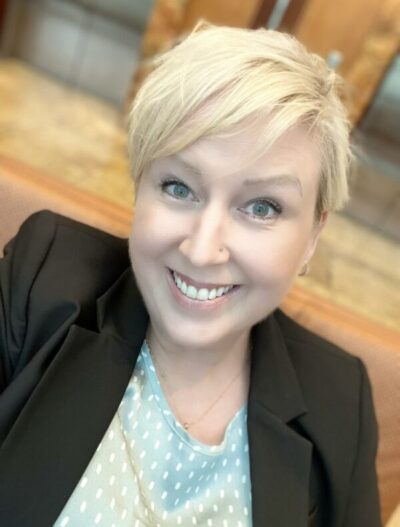After being diagnosed with breast cancer twice and a rare muscle disease in less than three years, Brittany Lee discovered her calling in patient advocacy. For the past two years, she has served as a patient research advocate at Huntsman Cancer Institute (HCI), where her lived experience fuels her mission to shape cancer research with the patient voice at the center.
In 2024, Brittany attended NBCC’s Project LEAD.
“Project LEAD gave me the tools to speak the language of science and the confidence to use my lived experience to shape it. It taught me how to ask questions that matter—for all types of breast cancer patients,” Brittany said. “Now I help guide clinical trials, research priorities, and policy with the patient voice at the center.”
Through her work with the HCI’s Breast and Gynecological Cancer Research Advocacy committee, under the leadership of chair and fellow LEAD graduate Carla Lloyd, PhD and scientific advisor Alana Welm, PhD, Brittany was introduced to the world of research advocacy—and found her passion.
At HCI, Brittany witnessed firsthand how patient feedback can lead investigators to revise grant proposals and trial designs, ensuring that discoveries are not only clinically sound but personally meaningful.
Her advocacy focuses on survivorship and metastatic breast cancer (MBC).
“As a young survivor, I live daily with side effects that impact my quality of life and likely my longevity. I’ve buried too many young friends—I want that to end,” Brittany said. “I have many friends living with MBC, and I want their lives extended and their quality of life enhanced.
“I’ll keep speaking up for those who no longer can, and for those who can but need support.”
Project LEAD reshaped how I approach my research advocacy. After that week, I found I had a deeper grasp of the science behind the disease and the confidence to step into conversations with researchers, clinicians, and doctors.
It helped shift my advocacy from the perspective of a survivor to that of being a collaborator. I learned how to interpret data, understand trial design, and ask critical questions that reflect the needs and concerns of diverse breast cancer patients—including those with metastatic disease and young survivors like myself.
Before Project LEAD, I had passion and lived experience. After Project LEAD, I had the language and tools to turn that into impact.
I now have more opportunities to contribute to the landscape of cancer research by participating in focus groups, helping shape clinical trials with the patient perspective at the forefront, and speaking to the side effects of current treatments that strongly affect quality of life.
It’s not just about being in the room; it’s about using my voice as an informed partner, and Project LEAD helped make that possible.
